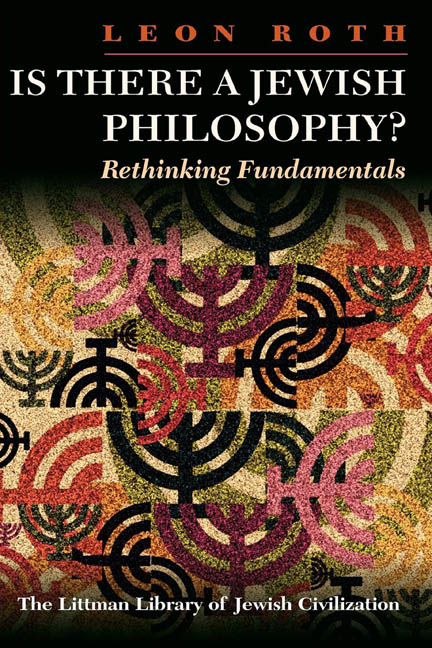Book contents
- Frontmatter
- Dedication
- Contents
- Publisher's Note
- Foreword
- Note
- Is there a Jewish Philosophy?
- Imitatio Dei and the Idea of Holiness
- Jewish Thought as a Factor in Civilization
- The Significance of Biblical Prophecy for Our Time
- Some Reflections on the Interpretation of Scripture
- Baruch Spinoza: His Religious Importance for the Jew of Today
- Judaism: The Elements
- Authority, Religion, and Law
- Moralization and Demoralization in Jewish Ethics
- Mysticism, Thick and Thin
- Back To, Forward From, Ahad Ha'am?
- Maimonides
- Bibliography of the Writings of Leon Roth
- Index
Note
- Frontmatter
- Dedication
- Contents
- Publisher's Note
- Foreword
- Note
- Is there a Jewish Philosophy?
- Imitatio Dei and the Idea of Holiness
- Jewish Thought as a Factor in Civilization
- The Significance of Biblical Prophecy for Our Time
- Some Reflections on the Interpretation of Scripture
- Baruch Spinoza: His Religious Importance for the Jew of Today
- Judaism: The Elements
- Authority, Religion, and Law
- Moralization and Demoralization in Jewish Ethics
- Mysticism, Thick and Thin
- Back To, Forward From, Ahad Ha'am?
- Maimonides
- Bibliography of the Writings of Leon Roth
- Index
Summary
PROFESSOR ULLENDORFF has graciously allowed me to append a few words to his own admirable sketch of the life and personality of Le on Roth. I, too, remain acutely conscious of the void which he left at his relatively early death, and regret that, to the present generation, his is but the name (coupled with that of his brother Cecil) of a square in a suburb of Jerusalem. But it is at least a matter of satisfaction that in 1997 a doctorate was conferred by the Hebrew University on Jan David Katzew for a thesis, written in English, entitled ‘Leon Roth: His Life and Thought. The Place of Ethics in Jewish Education'.
It may serve some purpose to record here where obituary notices and tributes appeared at the time of his death: The Times, 5 April 1963, supplemented by E. Ullendorff, 8 April; the Jewish Chronicle, 5 April; the Jerusalem Post(Norman Bentwich), and Ha'aretz(S. H. Bergmann),4April; the New York Times, 5 April; Molad, 21 (1963) (Ruth Kleinberger); the Proceedings of the British Academy, 50 (1965) (T. E. Jessop). The Magnes Press of the Hebrew University published a memorial brochure with contributions by S. H. Bergmann, M. Sternberg, and N. Rothenstreich, and a brief memoir by myself appeared in a memorial volume edited by me, and entitled Studies in Rationalism, Judaism and Universalism (London: Routledge, 1966).
Professor Ullendorff (p. xv) records Hugo Bergmann's surmise that the incident that made Roth decide to leave Israel was the massacre, in April 1948, of many Arabs at Deir Yassin by members of Jewish terrorist groups. In this connection, it is pertinent to reprint here a letter which he published in the Jewish Chronicle (4 December 1953) in reply to one from Dr Abraham Cohen in the aftermath of the Qibya raid. Cohen, writing apologetically, had conceded that the Israeli action deserved censure, but claimed that such Jewish protests as it had evoked were merely inspired by sensitivity to gentile recrimination. Roth rejoined as follows:
Problems of morals are notoriously complicated, and I have no wish to add to the difficulties raised by what is now called the Qibya incident. Dr Cohen's summing-up is clear. The Israelis, he says, are censurable, but most of the censurers should have remained silent.
- Type
- Chapter
- Information
- Is There a Jewish Philosophy?Rethinking Fundamentals, pp. xviii - xxPublisher: Liverpool University PressPrint publication year: 1999

